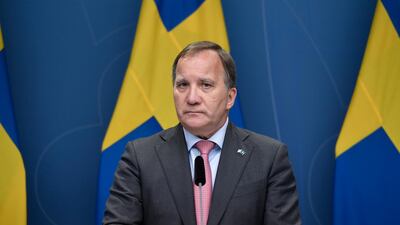Stefan Lofven has resigned a week after becoming the first Swedish leader to lose a no-confidence vote.
The Social Democrat did not call a snap election but instead asked the Speaker of the Swedish Parliament to begin the search for a replacement.
Andreas Norlen will ask the main party leaders if they can form a government. If that fails after four attempts, a snap election will have to be called. It would be the first such election in Sweden since 1958.
Mr Lofven lost the confidence vote on June 21 after the socialist Left Party withdrew its support following a clash about rent controls.
The government insisted on passing a new law that would have abolished Sweden’s system of setting rents by collective bargaining between landlords and the main tenants' union.
Mr Lofven, who will continue in a caretaker role until a new government is formed, led a fragile minority coalition with the Greens since 2018, relying on support from two small centre-right parties and the Left Party.
The centre-left and centre-right blocs are now evenly balanced and opinion polls show a general election might not change the picture.
Mr Lofven said "a snap election is not what is best for Sweden" because of the Covid-19 pandemic and the fact that a general election is due next year.
“The Speaker will now begin work on proposing a prime minister who can be tolerated by the Riksdag [the Parliament]," he said.
"The government will continue to govern the country for now but as the caretaking government.”
The last time coalition talks took place in Sweden was after the 2018 election that created a deadlocked Parliament. It took four months of negotiations to create the coalition government led by Mr Lofven.
In the present assembly, the left-leaning side and the centre-right bloc have about 40 per cent of the vote each.
None of the sides want to co-operate with the Sweden Democrats, a right-wing, populist party that is considered extreme.
The next general election is due to be held on September 11, 2022.

